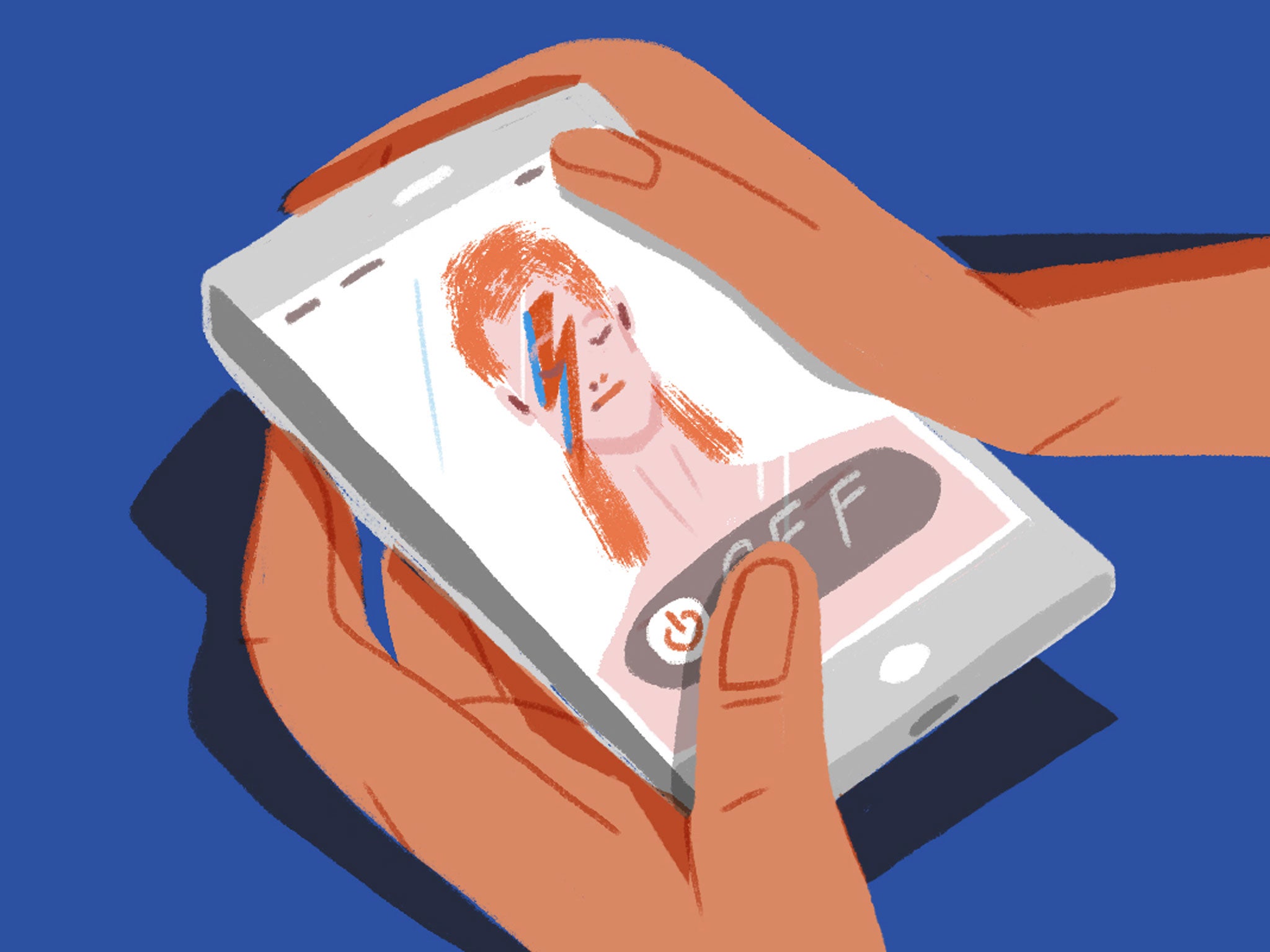Bowie's Law: Grief is a delicate thing and too much internet mourning can make hypocrites of us all
Everyone in Britain's access to the entire internet should be immediately cancelled for five days within moments of the Queen's passing, says Grace Dent


Your support helps us to tell the story
From reproductive rights to climate change to Big Tech, The Independent is on the ground when the story is developing. Whether it's investigating the financials of Elon Musk's pro-Trump PAC or producing our latest documentary, 'The A Word', which shines a light on the American women fighting for reproductive rights, we know how important it is to parse out the facts from the messaging.
At such a critical moment in US history, we need reporters on the ground. Your donation allows us to keep sending journalists to speak to both sides of the story.
The Independent is trusted by Americans across the entire political spectrum. And unlike many other quality news outlets, we choose not to lock Americans out of our reporting and analysis with paywalls. We believe quality journalism should be available to everyone, paid for by those who can afford it.
Your support makes all the difference.I read an article recently – online, when I probably should have been outdoors, or at least sitting upright – with the title, "This Is What Happens When The Queen Dies". It was a rather sombre piece citing the Government's plans for intensive national mourning, which I read for various morbid reasons. And nosy reasons. I was also, I now see, gently testing my feelings. A bit like putting my hand over the toaster to check if a real burn might hurt. It did hurt.
Not that the Queen is going anywhere soon, heaven forbid. But the odds say that one day she must, and I will be wholly all at sea when it happens. I'll be left as spiritually awry as many people were after the death of David Bowie. We don't know these famous folk personally, but we still feel a ferocious fondness for them. Such ends of an era are further proof that we ourselves are merely future dust. And that sucks.
Saying that, even I drew the line at the specification in the report that during the period of official mourning for the Queen all television comedy would be cancelled for at least five days. The Windsors seem to me like a robust lot. I just can't imagine that come day three they'd be all that discombobulated by, say, Dara O Briain on Live At The Apollo.
But what should be immediately cancelled for five days within moments of the Queen's passing is "everyone in Britain's access to the entire internet". "Bowie's Law", we could call it. My father, who's 79, often talks about how David Cameron should simply "turn off the internet" in order to "stop all these perverts and bomb-makers", and despite me explaining that no such all-purpose ACME-style button exists in Whitehall, I live in the hope that, on the quiet, in the event of Her Majesty dying, someone somehow manages to do it.
Because, be you royalist or republican, this will be a great moment to take up a soothing, craft-based pursuit like macrame. Or gluing shells to bottles. Or to do anything that doesn't involve venturing on to Twitter to seek solace for your loss – or to try to restore your sanity amid the hysteria – and becoming so furious that you want to track down @happyhorace45 and batter him into a pulpy goo with a blunt instrument. "Grief works in mysterious ways," you might find yourself telling a solicitor.
During periods of great mourning, the internet is a dangerous place, no matter how carefully or sincerely you tread. At least if a real-life funeral turns into fisticuffs, everyone involved can go home afterwards, sober up, and forget large swathes of the snarking that led to the incident. The internet tit-for-tatting over Bowie rumbled on for days, becoming bleakly personal as friends fought with friends, huddles formed, mortal offence was taken, and wounding words were hurled about.
"I could forgive @biggobbob for his views on Palestine and veganism," was the general gist, "but when he hinted on Facebook that I was only posting Ziggy Stardust lyrics to look cool – well, a line was crossed." "Sleep long, Thin White Duke," an earnest sort in Aberystwyth would tweet. "You taught me everything about gender fluidity." But for every 10 pink heart-shaped "likes" such people received for their tribute, at least one person would be scowling at their screen mumbling, "Really, @angellashes? Why does everything have to be about you?"
At times like this a curious divide opens up between the "we are upsets" and the "don't care and don't believe you do either" brigade. I have been on both sides of these battlegrounds. I'm sure I will be again. I did not act respectfully over the death of Michael Jackson. I mean, look at all these idiots posting pictures of themselves in a single black glove, crying! But then I was aghast when anyone questioned my sadness over the death of Adam Yauch from the Beastie Boys. Why would I make that up? How could people be so crass?
The exits of both Steve Strange and Whitney Houston floored me. I tweeted about my feelings. It felt like blowing a dog whistle, begging for companionship. But when Lou Reed died I just wanted all this dreadful outpouring of faux-grief to cease. And of course, if we're being honest, some internet mourners did post Bowie, Lou Reed and Yauch lyrics in order to look cool. But this is the problem with online mourning. Remember – my grief is real, your grief is a pose. You've faked it in an attempt to gain followers. On and on it goes. Internet grief makes hypocrites of us all.
Grief is a delicate, wonky emotion. It mutates into something quite strange and volatile when faced with the internet's multi-voiced, incoherent roar. Perhaps the one thing we learnt from David Bowie's death is that everyone feels things differently, so let's try to be patient with one other. Failing that, switch off your wi-fi router and meet me at mine for macrame.
Join our commenting forum
Join thought-provoking conversations, follow other Independent readers and see their replies
Comments